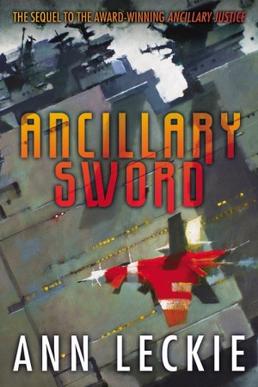1. The writing in here is very strong. It’s always nice to see an author improve—like George RR Martin did through the first book of his series,
A Song of Ice and Fire. Here, Leckie is more confident in her writing.
—This comes across through her allowing the fractured perspectives of the main character to be more sudden and potentially jarring. But she uses an introductory sentence typically to set the new scene. For instance:
“Speaking of mushrooms. Shall I send Nine out for something to eat?"
On Mercy of Kalr, Seivarden sat in the decade room with Sword of Atagaris’s Amaat lieutenant.
Here, a simple paragraph break carries the weight of the shift in perspective, but also allows the reader to understand that the main character, the AI Breq, is watching the new scene through its implants and it is not physically present. This understanding comes through the context and world building.
—Leckie also allows the action to be, as the old adage goes, “hours of boredom punctuated by seconds of terror.” I do not at all want to imply that this novel bored me at any point: it didn’t. It is driven by character development and Breq unravelling the mysteries of the system it has been sent to. But when the action does occur, it’s often quickly described, giving the reader a sense of its speed and suddenness, followed by reflections on the action. This is a strong tactic to give the reader a sense of the mental speed of the characters—fast during the action, and slower rumination during the reflection. It’s akin to her tactic used throughout here and
the first book with technology—name dropping first, then, after the scene is over, explaining some of the technology.
—The third tricky tactic the writing does successfully is sudden shifts in situation. This is best explained through an example:
[Hetnys] had walked about halfway across the shaded green and gray yard, was directly in front of that curving end of the bathhouse window when the bomb went off.
Here, Breq has just had a stressful conversation with Hetnys, which Hetnys extricated herself from awkwardly through a lie, when the sentence above occurs. The reader is reeling from the implications of the conversation and the way Hetnys felt the need to get out of the conversation so suddenly and falsely, and the bomb took Breq unawares—and the reader.
Through all three of these tactics, the reader is given a sense of the characters and the situations through the writing itself. This is strong writing that is often pulling double weight—both describing the situation while building characters through the specifics. Leckie is good.

2. One annoyance is that the novel’s first hundred pages or so are a bit slow. Though some important things happen, they take a while to happen and I feel like some of the situations do not entirely payoff as much as the time required to read them. I think the pace of the rest of the pages in this three hundred and fifty page book is stronger than that of the opening few. This doesn’t apply to the opening lines themselves: they carry forth from where the last book left off wonderfully, without resorting to an initial murder—thankfully. There is a sort of murder in the first hundred pages, sure, but by the point it occurs I already care about the writing, characters, and situation—allowing me to understand the import of the situation before it occurs. However, the first hundred pages plod a bit. This annoyance quickly passes though, as situations and characters gain import through reader familiarity and more information given. And yes, those first hundred pages set up the import, but I still can’t help feeling they could’ve done so more efficiently without losing effectiveness. My impulse would’ve been to keep that length, but add two more important actions to that section—there are already two important actions there: the murder thing and the complicated arrival at the new system. But I think two more would’ve worked: perhaps delving more into the medical procedures Breq went through, or a summary of the short bit of story between the two novels. What happened in that palace? What was the fight really like? I’m still curious about the space between the two novels.

3. However, I think Leckie’s pacing of the whole book is very interesting: she limits herself to a little over two weeks in these characters’ lives, yet so much happens that the character development is not empty. She does this through beginning in a time that is already important to the characters—the end of the last novel ensures this. But she also stays away from flashbacks. Instead of relying on flashbacks to give import and spark reader interest, she stays away from them, which allows the scenes to have an immediacy that is endearing. It feels like these scenes are all that matters. And I guess, when I’m in the now, I often act like now is all that matters. This works for her and helps her pacing really pull together for the large majority of the book. She also sticks to only a few places within the world: Garden, Undergarden, Governor’s Office and the concourse outside it,
Mercy of Kalr and its shuttles, and the tea-growing compound on the planet downwell. This low number of places allows the reader to really focus in on the characters, their development, and the actions instead of being constantly distracted by new place descriptions. Also, this is straight narrative, not the two-storylines she used in the first novel. She writes straight narrative well through having so much character intrigue going on that it never really lags—other than those first hundred pages. Yeah, not a lot of physical action happens through parts of the novel, but the political maneuvering keeps me reading and interested.

4. Leckie wonderfully expands the world-building in this novel. Here she uses the same tactic she did with technology in the first novel—name-dropping it, then explaining it with a few short sentences later—but expands it to include culturally significant events. For example, by this point in the story I’m pretty interested in the Radch itself—the Dyson sphere, not the culture—so she gives a few more hints into it through the technology and artifacts she describes. An early faction in the Radch, the Notai, is mentioned, then elaborated through three technological instances: the tea set, the shuttle’s storage locker, and the ship. I think this expansion of the tactic shows Leckie growing as a writer. It also shows how she continually focuses on the characters, but doesn’t leave the world-building bereft: she foreshadows in a way that avoids deus-ex-machina techs being introduced merely to serve the immediate needs of the characters. She avoids that cheap writing tactic by foreshadowing and remaining focused on the characters. Her world building has improved: she is better at it here than in the first novel.

5. Leckie still uses the personal pronoun “she” throughout, but now that Breq is a captain, the author also uses “sir” for people of all genders who are in command. In this way, using both a masculine and feminine pronoun throughout, she effectively communicates the genderless nature of the language brilliantly here. This seems a big improvement. Not only does it appear to be more even-handed and honest through using a sampling from both genders in language, but it's also more effective at communicating the genderless language through the contrast between using both a masculine and feminine word: it’s jarring the first time Leckie uses “sir”, just as jarring as it was in the first book when she called a male character “she”. The last book worked, but this works better. Yes, I understand the last book didn’t afford that many opportunities to use “sir” due to the plot, but perhaps it could have done something similar with a similarly masculine word.

6. Leckie’s voice requires the reader's attention. Something like
John Carter of Mars can be skimmed and still mostly grasped. But here, Leckie has three things happening that, in combination, require the reader to pay more attention:
—She uses a variety of word choices. No real changes here in her word choices—still above average, but not too obscure, like in the first book.
—She varies the sentence structures wonderfully—it’s not all noun-verb-adjective-noun-conjunctive-adjective-noun. She has clearly grown here, become more confident and comfortable with her variety.
—She also uses a heavily substitutive lexicon that includes a large number or pronouns and titles that suggests the reader slow down and parse it out. She finds a beautiful balance in substitutes that’s not annoyingly over-the-top, but is wonderfully both repetitive and varied. Rather than calling Breq by its name throughout, Leckie uses its titles—captain and fleet captain—its surname, its past titles—like
Justice of Toren—and contextually significant substitutive words. This variety wonderfully expands the possible ways that Breq is referred to—which might be a necessity with how often characters are named due to the fractured narrative that quickly shifts from character and situation to character and situation. In my own writing, I tend to shy away from “he said” or “she said” as the direct repetition of that so often used phrase can be mildly annoying to me as a reader, and mildly boring to write. Here Leckie applies this same shyness to the ways the characters are referred to. This wonderfully varies the word choice throughout. But it does require the reader to slow down ever so slightly and pay attention just a touch closer than most voices do. This small slowing also allows readers some space to keep their mind background mulling over the situations and characters in the book. This space and simultaneous light-rumination helps readers understand the subtlety Leckie uses in her narrative and voice, helps readers understand the import and implications of what is factually presented in the novel. Personally, though she pulls it off well, it’s not something I would yet find necessary in my own work, but it sounds like a lot of fun to work with. I’ve just seen it fail so many times before, seen it become an unintelligible mess requiring a notebook on the side for the reader to keep track of who is who and what they're called, that I’m wary of trying it. An example of this substitutive writing done wrong would be
Napoleon and his Marshals, which is a slog to read at times. Leckie succeeds at it though, through having a limited number of important characters, which Napoleon certainly didn’t have, and through limiting the number of titles or references.

7. The theme here is learning to live with a duty and a personal goal that might not fully mesh together, but finding a way to make them work simultaneously and still achieve both. Anaander attempts to twist Breq’s ambivalence into an asset by sending it to a duty in a place Breq actually wants to be, outside of the influence of Anaander. She allows Breq to travel there, but only if Breq does something for her—security in the system. Breq then murders a safeguard Anaander put into place that Breq didn’t agree to and wasn’t supposed to discover. Then Breq completes the task—and it isn’t some easy one: Breq overcomes big difficulties while actually attempting to complete the duty. Breq spends a lot of effort and time on its duty. But Breq does so much more that Anaander didn’t really intend and probably doesn’t want: it twists the intentions of Anaander to its own purposes. This basic plot outline shows the theme of the novel: working with difficulties and allowing them to influence oneself, but also making sure to keep the personal goal always in mind and, if possible, killing two birds with one stone. An example would be if a judge was supposed to decide if a personal friend got the death sentence or not. Breq is put into these conflict-of-interest situations, like we all are, and is forced to face up to them and try its best. I think that this is the main theme here, but certainly not the only one:
Tor.com suggests that the book is “an extended meditation on power, and identity, and morality.” And this is a valid way to view the book. Identity makes the most sense because “what is a human?” is a major question: the Preseger can’t distinguish differences between humans; pre- and post-annexation humans are vastly different; each system in the culture exhibits slight cultural differences—like the male genitalia festival; the various cultural groups encountered are seen as varying levels of human—the harvesters are seen as sub-human effectively, though lip service to their inherent humanity is given by most; as well as Tisarwat and the ever-present ancillaries—Breq is made a human citizen from an ancillary, the translator, Breq’s crew that apes being ancillaries, and the captive from the Ungdergarden all approach this question. But I feel like this theme is carried over from the first novel, so the new theme, finding a way to complete public duty and personal goals simultaneously, stands out more to me. But it might just be my time of life that gives this new theme predominance in my mind.

8. Leckie is bad at attempting to introduce new readers to the story. She uses awkward sentences to remind old readers of the events of the first novel and introduce new readers to them. I think these type sentences are typically bad: most writers are bad at this. But Leckie uses sentences that stand out from her voice. They’re not terrible, they’re just not up to the quality of the rest of this work. They don't fit in her voice. I think George RR Martin does this the best that I’ve read in a long time. At this year’s
Worldcon, Leckie and Martin were sitting on a three-person panel before the awards ceremony, discussing the Puppy Wars, or whatever that kerfuffle was called. Leckie could learn from Martin here. I think Martin does it through trusting the reader to remember most of it, then using one, maybe two sentences to recall the prior plot points. His sentences also usually show something that wasn’t shown before: how a character felt about an event, what changes an event had on a character and why, or the affects that event had on the world. Leckie's sentences are simply recap. Ugh.
9. A few short thoughts to close with:
—Leckie uses her descriptions well, though the descriptions themselves are good, not spectacular;
—if the next novel ends with Breq being faced with death-by-vacuum I’m going to be more than slightly annoyed—she uses such a wonderful variety of words, sentence structures, and character motivations that another ending almost-death-by-vacuum felt a little cheap, she'd already used that threat before so it lacks some effectiveness here;
—her plot is convoluted in a legible, interesting way;
—she’s good at making Breq seem intelligent without relying upon deus-ex-machina reveals that the reader couldn’t have figured out, like
Foundation, or an over-abundance of set pieces;
—where the last novel made science fiction better by doing space opera well, this one does it by doing character drama in space so well;
—and I am excited to read the next novel, which came out this month.
.jpg)















.jpg)












.jpg/462px-Small_Magellanic_Cloud_(Digitized_Sky_Survey_2).jpg)












.JPG/640px-Set_of_shackles%2C_late_18th_century_from_Tamale%2C_Ghana%2C_International_Slavery_Museum%2C_Liverpool_(1).JPG)











